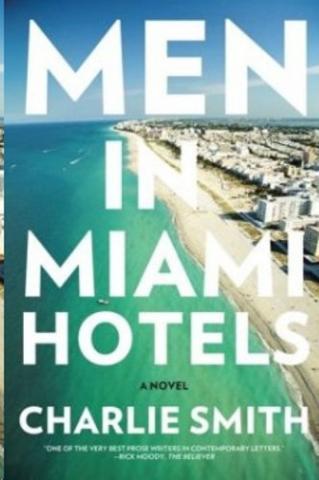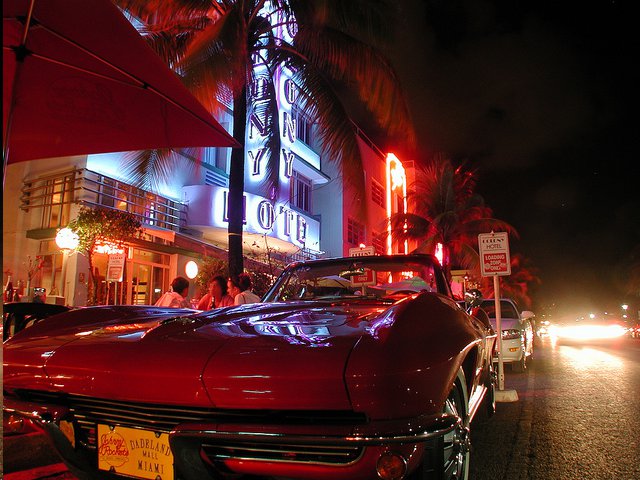Love and Mayhem Take up Residence in ‘Men in Miami Hotels’

Men in Miami Hotels
Charlie Smith
Harper Perennial
304 pages
Cot Sims, the hero of Charlie Smith’s new novel, is a Florida-born gangster hoping to wind down his career after first seeing to the well-being of his mother in Key West. A recent hurricane has left her house unlivable—at least by the city inspector’s standards—and she needs money either to rebuild or relocate. Toward this end, Cot steals a pouch of emeralds belonging to his boss, Albertson, a gangland kingpin who sends his unpitying henchmen in pursuit. After the emeralds turn up missing (that is, out of Cot’s possession), things go bad, then very bad, and then really bad.
While Smith makes supple use of traditional crime genre devices and motifs, the scenes he creates—in Miami, in Key West and the surrounding islands, on the quaint backstreets of Havana—are fresh and beautifully rendered. It takes a few pages to get accustomed to the novel’s jerky pacing, but soon the reader is hooked. Why? First and foremost, because of the language:
“Up and down the Keys fish washed up dead in the mangroves and onto the beaches. Big trees keeled over and yellowed palm fronds rattled like skeletons dancing on the roof. Salt spray dried white as snow on the sea grapes out at the beach. And upstream, up-ocean in mainland river mouths manatees floated like bloated fat men, belly up.”
In Smith’s novel, a character’s wig, “like an orange egret nest, sat puffed and glistening on the table.” A “tiny, ambidextrous breeze” floats down an alley. In Albertson’s headquarters we find “the factotums and skill men and hangers-on, the rumble boys and the slack, ruined characters kept around by Albertson to remind him of worlds and episodes most men would want to forget.” Cot “sits in the shade looking out at the ocean, a bleak expression on his face like that of a man marooned on an island nobody will discover for years.”
In other words, Smith is terrific at atmospherics and the prose throughout Men in Miami Hotels absolutely sparkles.
Cot is infinitely resourceful; it’s part of his charm. He’s forever getting the jump on his murderous adversaries in clever and unexpected ways. At first the violence is brief and farcical, until suddenly it’s not:

“He takes three quick steps into the lot and with the pistol, Bert’s pistol, shoots the man once in the head. The sound of the shot is loud, but it is only one shot and a single shot you can always just wonder about and let go.”
The body count rises and losses become frighteningly personal—a fact upon which Cot ruminates at great length, perhaps to the detriment of the novel’s otherwise propulsive forward motion. Occasionally the action stops altogether, while Cot and his lover Marcella revisit old times, lament the current state of things and bemoan their prospects for the future. Then representatives of the different groups Cot has managed to aggrieve descend on his hiding places and more mayhem ensues.
At one point, Cot’s mother returns to her damaged home, where she sits “in the east window looking out at the pale purple flowers of the frangipani tree” and listens to “little house geckos chirping like docents.” Moving to the bathroom:
“She ran a bath and got into the tub and listened to Bach’s oboe concerto on her little player while she lazed in the cool water. In the spaces between the notes she thought she could just hear Bach’s wife calling him to supper.”
Charlie Smith’s adroit use of mood, metaphor and setting invites comparisons to Thomas McGuane’s classic Key West novel, Ninety Two in the Shade, and Denis Johnson’s Fiskadoro. But Men in Miami Hotels inhabits a lush world of doomed love and sweat-soaked treachery that is uniquely its own.
Author Bio:
Lee Polevoi, Highbrow Magazine’s chief book critic, is working on a novel, The Confessions of Gabriel Ash.
Photos: Location Site; Visit Florida (Flickr).





























































































































































































































































































































